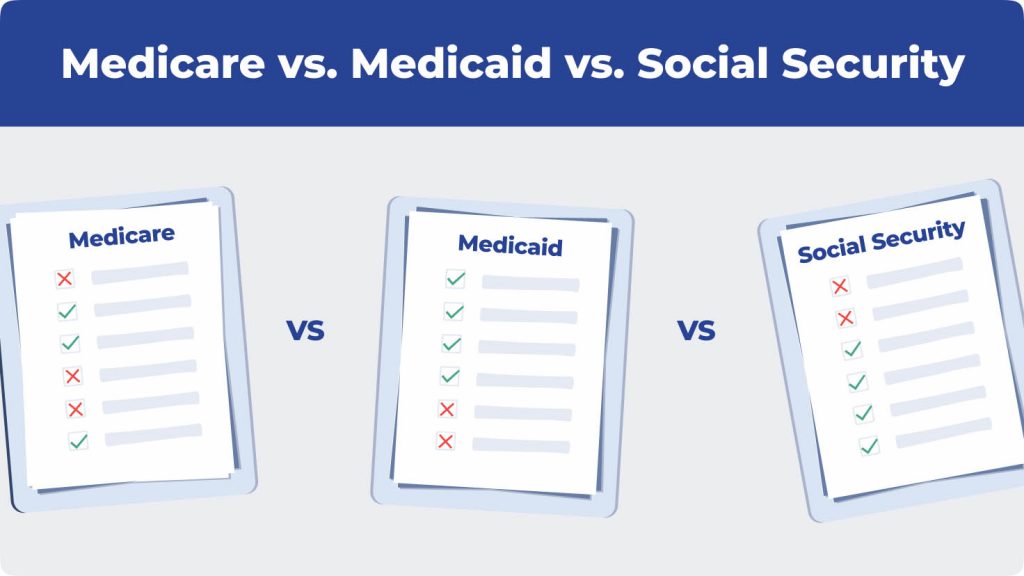
Medicare and Social Security are federal government programs offering Americans some reassurance and a safety net through retirement or disabilities. Both programs are very similar but very different. Below we’ll review the current state of Medicare and Social Security and what it means for you.
Current State of Medicare and Social Security
Medicare currently provides health insurance coverage to more than 62 Americans nationwide. This includes Americans 65 and older, individuals diagnosed with End-Stage Renal Disease (ESRD), and those with disabilities.
On a long-term outlook, Medicare faces challenges in the financial realm due to an aging population and healthcare costs that continue to rise. However, the Medicare program is currently stable and projects that it can pay for full benefits until 2026.
The Social Security program offers disability, retirement, and survivor benefits to more than 65 million American citizens.
Much like Medicare, the Social Security program also faces financial challenges on a long-term scale due to the same issues of aging populations, rises in living expenses, and drastic changes to the workforce. However, the program can pay full benefits for at least 12 years.
Social Security and Medicare tax rate
In the United States of America, there is a Medicare tax rate of 1.45% for employees and employers. There’s no income limit for this Medicare tax, but if you make more than $200,000 annually (or $250,000 for married couples), there’s an additional 0.9% in Medicare tax costs.
The Social Security tax rate is 6.2% for employees and employers for up to $147,000 annually. So, the combined tax rate for Medicare and Social Security is 7.65% on earnings.
Starting Medicare and Social Security
As an American citizen, you can begin receiving Social Security benefits when you turn 62 years old. However, your monthly benefits will be reduced if you start collecting retirement benefits before you hit the full retirement age.
You can easily apply over the phone, in person, or online to begin receiving Social Security benefits. Note that you can apply for benefits three months before you wish for your benefits to begin.
As far as Medicare is concerned, you can enroll in Parts A and B once you turn 65 or earlier if you have a qualifying disability or health condition, like Amyotrophic Lateral Sclerosis (ALS).
You’ll have a seven-month timeframe to enroll in Medicare which encompasses three months before you turn 65, your birthday month and the three months following your birthday.
You can apply for Medicare benefits in-person, by phone, or online. The best way to ensure you avoid any late enrollment fees, you’ll want to make sure and apply for Medicare during the Initial Enrollment Period.
Medicare and Social Security Disability
Social Security Disability and Medicare are different programs, but folks who receive SSDI benefits also qualify for Medicare benefits after a specific waiting period.
To be eligible for SSDI benefits, you must have worked and contributed to Social Security taxes for a particular amount of time before becoming disabled.
You’ll have a 24-month waiting period from the date you become eligible for SSDI benefits. You’ll also automatically enroll in Medicare (Parts A and B).
How are months counted?
When counting the 24-month waiting period for SSDI benefits, the Social Security Administration (SSA) counts the entire month between the date that SSA determines your disability started and the date you qualify for Medicare.
For instance, if the SSA finds that your disability began on January 15, 2023, and your SSDI benefits start on June 15, 2023, your 24-month waiting period for Medicare would commence on January 1, 2024, and end on December 21, 2025.
When do previous periods of disability count?
If you have prior disabilities, it can affect your qualification for SSDI and your Medicare waiting period. Suppose, for any reason, you received SSDI benefits in the past, and you stopped getting them because of returning to work, making too much money, and becoming disabled again within five years.
In that case, SSA might consider the new disability a continuation of your previous disability. If this is the case, you could qualify to have your SSDI benefits reinstated on an expedited basis and may not have to go through the re-application and determination process again.
If the new disability is considered a continuation of disability, then any previous months you received SSDI benefits contribute towards the 24-month waiting period for Medicare benefits.
What happens to Medicare coverage if a beneficiary works?
If you receive Medicare coverage and decide to continue working, your Medicare coverage will typically remain the same. But, there are some things to remember with this.
If you already receive Medicare Part A coverage, you’ll still have this coverage whether you work or not. If you already get Part B benefits, you’ll still have this coverage, and premiums will be based on your monthly income.
Suppose you have group health coverage through your employer, your employer’s coverage may be primary, and Medicare coverage may be a secondary form of health coverage.
This can vary so check with your benefits administrator for details of the employer coverage and the coordination of Medicare
Qualifying for Medicare with Social Security disability
Medicare coverage is open for those with specific disabilities and under 65. To qualify, you must receive SSDI benefits for at least 24 months before or be diagnosed with Lou Gehrig’s disease (ALS) or ESRD.
Once a beneficiary is determined disabled, there’s a five-month wait period to start collecting SSDI benefits. Americans with ALS or ESRD don’t have to wait the 24-month waiting period to begin getting Medicare benefits.
If you have ESRD, you can receive Medicare benefits three months after starting regular dialysis or receiving a kidney transplant.
And if you are diagnosed with ALS, you can begin receiving Medicare benefits as soon as you start collecting your SSDI benefits.
How Do People With Disabilities Enroll In Medicare?
Individuals who have specific disabilities can enroll in Medicare just as anyone else who’s eligible for Medicare coverage can. If you receive SSDI benefits, you’ll typically be automatically enrolled in Parts A and B.
You should get a card in the mail three months before you hit your 25th month of SSDI payments. If you’re not automatically enrolled, you can enroll manually. You can apply in person at your local Social Security office, over the phone, or online.
Enrolling in Medicare with Social Security disability
In most cases, you won’t need to contact anyone about enrolling in Medicare if you receive SSDI benefits. You’ll likely receive a package containing your new Medicare card and a letter about three months before Medicare coverage begins.
However, there’s always an off-chance that you won’t be automatically enrolled in the Medicare program. If you don’t get enrolled automatically, you can sign up online, in person, or over the phone with your local SSA office.
Differences between Medicare, Medicaid, and Social Security
While Medicare, Medicaid, and Social Security are all federal programs, they have stark differences.
Medicare and Medicaid
Medicare is a federal health care program that provides health insurance coverage for those 65 and older or those with qualifying disabilities.
Because Medicare is federally run, beneficiaries will have the same Medicare coverage, despite which state they reside in. Those who get Medicare benefits are responsible for Part B benefits and other out-of-pocket expenses.
Medicaid is a state-run program that helps pay for healthcare-related costs for those with limited or no income. The federal government has specific regulations that the state’s programs must follow.
However, since it’s also a state program, each state has its enrollment eligibility requirements, and benefits can vary from state to state. In most cases, those who receive Medicaid benefits won’t need to pay anything out-of-pocket, such as monthly premiums.
Medicare and Social Security Disability
Medicare is a federal health insurance program providing pertinent health coverage to those 65 and older or those with eligible disabilities.
Social Security Disability is an income support program that offers recipients monthly benefits to live on if they can’t work due to a disability.
FAQs
Is Congress ending the Medicare and Social Security programs?
No, Congress isn’t ending Medicare and Social Security programs. Tens of millions of Americans incredibly value both federally-managed programs.
How are Medicare and Social Security funded?
Payroll taxes from both employees and employers fund both Medicare and Social Security. Even self-employed workers must pay payroll taxes which contribute heavily to these programs.
Why do Social Security and Medicare pose problems for the federal government budget?
Social Security and Medicare pose issues for the federal government budget based on several factors. Annually, the number of retirees is growing, the employee-to-retiree ratio is steadily decreasing, and life expectancies for those retiring are increasing.
When do I apply for Medicare and Social Security?
You can apply for Medicare and Social Security based on various factors. You’ll automatically be enrolled in Medicare if you already get Social Security benefits.
You must enroll in Original Medicare during the Initial Enrollment Period if you’re not already receiving Social Security benefits.
What is the relationship between Medicare and Social Security disability?
Both the Medicare and SSDI programs tie into one another. Beneficiaries who receive SSDI benefits are usually also eligible for Medicare coverage.
Can a person who is 60 yrs old and on Social Security disability get Medicare?
Yes, someone who is 60 years old and on Social Security Disability can receive Medicare benefits as well. However, they’ll have to wait for the mandatory 24-month waiting period before Medicare benefits kick in.
Get help finding Medicare plans in your area
When you’re ready to find a Medicare plan in your area, give our team of dedicated agents a call. We can provide free quotes online or walk you through the Medicare process over the phone. Let us get you covered with the best coverage available today!
Related Articles
- How Your Social Security Impacts Medicare
- How Many Seniors Live in Poverty in the United States?
- Is the federal Government Cutting Medicare Advantage?
- Top 5 Government Benefits for Seniors Over 65
- What does it Mean to Sunset Social Security and Medicare?
